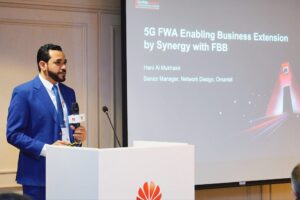The discussions will also delve into experiences and latest findings on how 5G has provided support to worldwide efforts in combating COVID-19
What are SAMENA Council’s plans for holding its annual private and public-sector leaders’ congregation, the Leaders’ Summit, this year?
SAMENA Council’s Leaders’ Summit 2020 will be held on July 9th in collaboration with the TRA-UAE and Huawei Middle East, and, virtually, will bring together ICT leaders and decision-makers from across regions, including policy-makers, heads of regulatory authorities and premier global ICT development bodies, CEOs of large telecom operator groups, top-level executives from telecommunications service providers, professionals, experts from vertical ICT segments and more from South Asia, the Middle East, North Africa, Asia, Europe, and beyond.
What is significant about the Leaders’ Summit 2020’s agenda?
Firstly, Leaders’ Summit 2020 will be held quite differently in terms of our arrangements to bring leaders’ together under a very complex agenda, and we will be relying heavily on available digital communications technologies to make our discussions possible. Secondly, the aim of the Leaders’ Summit this year is to highlight the concept of 5G+X, with specific focus on building momentum to accelerate 5G adoption across the region by involving the telecom and other industries in a synergistic manner, and materialize real-life use cases that can leverage 5G along with allied technologies.
The complexities of the 5G ecosystem necessitate cross-industry collaboration and it is crucial that we exploit advanced technologies such as AI, cloud and big data analytics, in order to drive meaningful connectivity and overcome challenges to revitalize socio-economic development and new investments both within the ICT industries as well as in those sectors that are leveraging advanced mobile broadband technologies and ICTs, in general.
The discussions of the SAMENA Council Leaders’ Summit 2020 will also delve into experiences and latest findings on how 5G has provided support to worldwide efforts in combating COVID-19, and what to expect in the middle-to-long term with respect to global economic outlook and meeting objectives of the Connect 2030 Agenda.
Apart from your role as CEO of SAMENA Council, and as Broadband Commissioner, are you satisfied with the Industry’s response to challenges posed by the pandemic and “Agenda for Action”?
You have raised an important question, as it concerns one of the most timely and well-defined blue-prints issued by the UN Broadband Commission for Sustainable Development, and it serves the SAMENA Council’s membership well that the Council is highly active in the Commission.
Overall, Telecom Operators have played a tremendous role in combating the very many challenges posed by the current pandemic, and this role of Operators has been both promoted by SAMENA Council, by virtue of its presence in all leading international industry bodies as an advocate for Operators, and has also been globally acknowledged. However, in accordance with the Agenda for Action defined by the Commission, a leading example among Operators that demonstrated leadership and reacted expertly to ensuing challenges posed by the pandemic, includes stc Group of Saudi Arabia. Eng. Nasser Al Nasser, stc Group CEO and Chairman of SAMENA Council, has drawn great parallels between what stc carried out during COVID-19 and the imperatives identified by the Commission in the wake of the pandemic, demonstrating that digital infrastructure and the private sector’s readiness are fundamental to succeeding in the digital world during and in the aftermath of COVID-19. Under Eng. Nasser’s leadership, stc Group continues to engage actively with the society to complement government’s efforts, and to fulfill the objectives set forth as global imperatives, including those identified by the Broadband Commission.
As a highly active member of the international ICT community, how do you define success in the post COVID-19 era and for the next decade?
Our success in the post COVID-19 era, during which we have many challenges to overcome including successfully exiting the pandemic and bringing the world’s economy back on track, will be determined by, first, our real progress made in leveraging digital communications technologies and their meaningful application in accordance with newest human life experiences during recent crisis situations witnessed all around the world; second, our commitment to collaborating and synergistically involving all economic sectors and stakeholders of the economy in fulfilling the vision of a sustainable future; and, third, by our ability to create an equilibrium between the technological capabilities and the right to prosperity for all, so to leave no one behind. It all, however, rests on new collaboration-minded approaches and revamped decision-making approaches that need to be adopted, and through which objectives such as resilient connectivity, affordable access, and safe use of online services may be achieved. New collaboration mechanisms and decision-making approaches, which are also essential to devising new infrastructure funding models, are essential for bringing the world’s 2.7 billion still-unconnected citizens to participate in sustainable future-making.
In relation to 5G, what trends should we be mindful of and where should the private and public sectors’ focus be?
As the latest data consumptions trend indicate, the coming years will witness exponential rise in the multi-faceted use of the Internet, AI and robotics-driven automation, continued urbanization and smart-city management, a new world-economic order, new life styles and healthcare expectations, new modes of educational delivery, digitization of public services and digital identity implementation, digital immersive experiences and entertainment, advancements in food technologies, advanced manufacturing through industrial IoT, and a host of other anticipated advancements.
The Industry’s focus during this time should be on technology development but equally so on reassessing policy, regulatory, and governance approaches. SAMENA Council believes it is time to ignite policy and regulatory culture change. Some immediate needs of the Industry include making spectrum resources available in a timely and cost-effective manner, incentivizing new investments including on fiber infrastructure, granting right-of-way and access to civil infrastructure, reducing taxation and industry fees, promoting cross-border data flows, fostering digital trust-building through secure networks and data privacy practices, protecting the growing number of young digital users, and encouraging non-telecom industries’ engagement with the telecom industry.
What are your thoughts about the imperative of having cybersecurity measures put in place across the Industry?
Lately, remote working and remote learning have become the new norms, but there is a major challenge that this approach has made clear: Businesses, organizations, as well as the employees, and students, must learn to safeguard information and data; both their own and of the organizations. Everything in the name of Coronavirus, causing both panic, opportunistically distracting end-users and exploiting the unwary users online, is possible.
Exploitative acts range from phishing emails and more malicious acts, including harvesting user log-in information, exploitation of children and young people (CYP) online, to direct network attacks.
Cybersecurity measures, if taken coherently, have the power to sustain positivity and hope, and both curtail and fight false information that feeds negativity and hopelessness in the wake of real-life challenges, such as the new Coronavirus. With our ripening 5G capabilities and technologies, including Artificial Intelligence, we certainly have sufficient means and tools available to us but we need to work toward speedily implementing (and not just discussing) identifiable and practicable cybersecurity measures. The Internet’s information pathways, just like our respiratory pathways, must be kept clean for their intended, positive purpose of developing and sustaining the nascent digital economy.
How would you define digital trust-building in the era of 5G?
5G’s potential of helping to create a sustainable digital society in the long run in collaboration with other industries and economic sectors, requires, among other things, ensuring integrity of data, protecting it against all imaginable misuse and irrelevant access. While Telecom Operators are relatively new to realizing the ever-more-complex challenge of protecting and reacting to security threats on their networks, and threats that can both physically and emotionally threaten the well-being of network users, the challenge of security has a direct bearing on our ability to create and foster trust-building in the digital space, fulfill both ICT and health policy and regulatory demands, for example, and conduct business and investment planning in a sustainable manner, while justifying further investments. The notion of trust-building is also highly important for addressing critical societal issues, such as Child Online Protection (COP), and for which COP guidelines by the ITU and recommendations by the UN Broadband Commission are most pertinent.
In contrast to the obvious and very debilitating effects of COVID-19, are there any positive sides to this health crisis for the Industry?
In my opinion, within the Digital Communications Industry, a change in mindsets and approaches has been catalyzed by COVID-19. This change would later prove to be an essential ingredient for not only managing future challenges of pandemic scale, but also for accelerating digital cooperation necessary for meeting globally defined goals for the next decade. Despite posing a myriad of socio-economic challenges, the Corona-virus crisis of 2020 has steered our direction on the use of ICTs for provisioning healthcare services, delivering education, and how the world’s private and public-sectors co-operate, to help synergize collaboration in digital transformation through broadband connectivity, digitization, and innovation at an accelerated pace.
In so doing, a foundation has been created for a 5G cultural shift, and we have observed over the past several months that Regulators and Operators, together, can achieve major milestones effectively and efficiently if larger goals of the scale of SDGs are visible on the horizon.
In the Leaders’ Summit 2020, SAMENA Council anticipates a prolific exchange of expert views and insights, not only covering experiences during the COVID-19 crisis, but also on the future of the ICT Industry and how our collective efforts could help accelerate the realization of the vision for a better-connected world.








